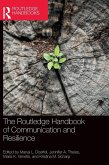The Handbook of Comparative Communication Research
Herausgeber: Esser, Frank; Hanitzsch, Thomas
The Handbook of Comparative Communication Research
Herausgeber: Esser, Frank; Hanitzsch, Thomas
- Gebundenes Buch
- Merkliste
- Auf die Merkliste
- Bewerten Bewerten
- Teilen
- Produkt teilen
- Produkterinnerung
- Produkterinnerung
This handbook provides comprehensive understanding of comparative communication research. It fills an obvious gap in the literature and offers an extensive discussion of the general approach of comparative research, its prospect and problems as well as its applications in crucial sub-fields of communications.
The Handbook of Comparative Communication Research provides a comprehensive examination of comparative communication research. It offers extensive and interdisciplinary discussions of the general approach of comparative research, its prospect and problems as well as its applications in crucial sub-fields of communication.…mehr
Andere Kunden interessierten sich auch für
![The Handbook of International Trends in Environmental Communication The Handbook of International Trends in Environmental Communication]() The Handbook of International Trends in Environmental Communication259,99 €
The Handbook of International Trends in Environmental Communication259,99 €![The Routledge Handbook of Communication and Resilience The Routledge Handbook of Communication and Resilience]() The Routledge Handbook of Communication and Resilience274,99 €
The Routledge Handbook of Communication and Resilience274,99 €![The Handbook of Communication Science and Biology The Handbook of Communication Science and Biology]() The Handbook of Communication Science and Biology258,99 €
The Handbook of Communication Science and Biology258,99 €![The Handbook of Communication History The Handbook of Communication History]() The Handbook of Communication History390,99 €
The Handbook of Communication History390,99 €![The Handbook of Intergroup Communication The Handbook of Intergroup Communication]() The Handbook of Intergroup Communication366,99 €
The Handbook of Intergroup Communication366,99 €![The Routledge Handbook of Ethics in Technical and Professional Communication The Routledge Handbook of Ethics in Technical and Professional Communication]() The Routledge Handbook of Ethics in Technical and Professional Communication279,99 €
The Routledge Handbook of Ethics in Technical and Professional Communication279,99 €![The Handbook of Communication and Security The Handbook of Communication and Security]() The Handbook of Communication and Security263,99 €
The Handbook of Communication and Security263,99 €-
-
-
This handbook provides comprehensive understanding of comparative communication research. It fills an obvious gap in the literature and offers an extensive discussion of the general approach of comparative research, its prospect and problems as well as its applications in crucial sub-fields of communications.
The Handbook of Comparative Communication Research provides a comprehensive examination of comparative communication research. It offers extensive and interdisciplinary discussions of the general approach of comparative research, its prospect and problems as well as its applications in crucial sub-fields of communication.
The Handbook of Comparative Communication Research provides a comprehensive examination of comparative communication research. It offers extensive and interdisciplinary discussions of the general approach of comparative research, its prospect and problems as well as its applications in crucial sub-fields of communication.
Produktdetails
- Produktdetails
- Verlag: Routledge
- Seitenzahl: 568
- Erscheinungstermin: 2. April 2012
- Englisch
- Abmessung: 260mm x 183mm x 35mm
- Gewicht: 1250g
- ISBN-13: 9780415802710
- ISBN-10: 0415802717
- Artikelnr.: 34744357
- Herstellerkennzeichnung
- Libri GmbH
- Europaallee 1
- 36244 Bad Hersfeld
- gpsr@libri.de
- Verlag: Routledge
- Seitenzahl: 568
- Erscheinungstermin: 2. April 2012
- Englisch
- Abmessung: 260mm x 183mm x 35mm
- Gewicht: 1250g
- ISBN-13: 9780415802710
- ISBN-10: 0415802717
- Artikelnr.: 34744357
- Herstellerkennzeichnung
- Libri GmbH
- Europaallee 1
- 36244 Bad Hersfeld
- gpsr@libri.de
Thomas Hanitzsch is Professor of Communication at the Institute of Communication Studies and Media Research, University of Munich, Germany. A former journalist, his teaching and research focuses on global journalism cultures, war coverage, celebrity news and comparative methodology. He has authored and edited five books, and his work has been published in major communication journals and edited volumes. Thomas is currently Editor-in-Chief of Communication Theory, and serves as Vice-Chair of the Journalism Studies Section of the European Communication Research and Education Association (ECREA). He is currently leading the Worlds of Journalism Study, a massive multinational survey of journalists, and is involved in several other comparative projects. Frank Esser (PhD 1997, University of Mainz) is Professor and Chair of International & Comparative Media Research in the Department of Mass Communication and Media Research at the University of Zurich. He was assistant professor of mass communication at the University of Mainz and the University of Missouri-Columbia, and visiting professor at the University of Oklahoma. His research focuses on cross-national studies of news journalism and political communication. He has published five books including Comparing Political Communication: Theories, Cases, and Challenges (Cambridge University Press, 2004), and sixty book chapters and journal articles. Frank is on the editorial boards of Journalism and The International Journal of Press/Politics, and serves as Vice Chair of the Journalism Division of the International Communication Association (ICA). In Zurich he is co-director of the NCCR Democracy, a National Center of Competence in Research funded by the Swiss Science Foundation, to study the impact of globalization and mediatization on Western democracies.
Foreword
PART I: INTRODUCTION
1 On the Why and How of Comparative Inquiry in Communication Studies
PART II: DISCIPLINARY DEVELOPMENTS
2 Comparing Political Communication
3 Comparing Organizational and Business Communication
4 Comparing Development Communication
5 Comparing Computer-Mediated Communication
6 Comparing Visual Communication
7 Comparing Intercultural Communication
8 Comparing Language and Social Interaction
9 Comparing Gender and Communication
10 Comparing Health Communication
PART III: CENTRAL RESEARCH AREAS
11 Comparing Media Systems
12 Comparing Media Systems: A Response to Critics
13 Comparing Media Policy and Regulation
14 Comparing Media Markets
15 Comparing Media Cultures
16 Comparing Journalism Cultures
17 Comparing Public Relations
18 Comparing Election Campaign Communication
19 Comparing News on National Elections
20 Comparing News on Europe: Elections and Beyond
21 Comparing News on Foreign and International Affairs
22 Comparing Cross-border Information Flows and their Effects
23 Comparing Entertainment and Emotions
24 Comparing Media Use and Reception
25 Comparing Effects of Political Communication
PART IV: CONCEPTUAL AND METHODOLOGICAL ISSUES
Challenges to Comparative Research in a Globalizing Media Landscape Sonia Livingstone
27 Comparative Research Designs: Toward a Multilevel Approach
28 Comparative Survey Research
29 Comparative Content Analysis
30 Securing Equivalence: Problems and Solutions
31 Analyzing Comparative Data: Opportunities and Challenges
PART V: CONCLUSION: 32 Challenges and Perspectives of Comparative Communication Inquiry
PART I: INTRODUCTION
1 On the Why and How of Comparative Inquiry in Communication Studies
PART II: DISCIPLINARY DEVELOPMENTS
2 Comparing Political Communication
3 Comparing Organizational and Business Communication
4 Comparing Development Communication
5 Comparing Computer-Mediated Communication
6 Comparing Visual Communication
7 Comparing Intercultural Communication
8 Comparing Language and Social Interaction
9 Comparing Gender and Communication
10 Comparing Health Communication
PART III: CENTRAL RESEARCH AREAS
11 Comparing Media Systems
12 Comparing Media Systems: A Response to Critics
13 Comparing Media Policy and Regulation
14 Comparing Media Markets
15 Comparing Media Cultures
16 Comparing Journalism Cultures
17 Comparing Public Relations
18 Comparing Election Campaign Communication
19 Comparing News on National Elections
20 Comparing News on Europe: Elections and Beyond
21 Comparing News on Foreign and International Affairs
22 Comparing Cross-border Information Flows and their Effects
23 Comparing Entertainment and Emotions
24 Comparing Media Use and Reception
25 Comparing Effects of Political Communication
PART IV: CONCEPTUAL AND METHODOLOGICAL ISSUES
Challenges to Comparative Research in a Globalizing Media Landscape Sonia Livingstone
27 Comparative Research Designs: Toward a Multilevel Approach
28 Comparative Survey Research
29 Comparative Content Analysis
30 Securing Equivalence: Problems and Solutions
31 Analyzing Comparative Data: Opportunities and Challenges
PART V: CONCLUSION: 32 Challenges and Perspectives of Comparative Communication Inquiry
Foreword
PART I: INTRODUCTION
1 On the Why and How of Comparative Inquiry in Communication Studies
PART II: DISCIPLINARY DEVELOPMENTS
2 Comparing Political Communication
3 Comparing Organizational and Business Communication
4 Comparing Development Communication
5 Comparing Computer-Mediated Communication
6 Comparing Visual Communication
7 Comparing Intercultural Communication
8 Comparing Language and Social Interaction
9 Comparing Gender and Communication
10 Comparing Health Communication
PART III: CENTRAL RESEARCH AREAS
11 Comparing Media Systems
12 Comparing Media Systems: A Response to Critics
13 Comparing Media Policy and Regulation
14 Comparing Media Markets
15 Comparing Media Cultures
16 Comparing Journalism Cultures
17 Comparing Public Relations
18 Comparing Election Campaign Communication
19 Comparing News on National Elections
20 Comparing News on Europe: Elections and Beyond
21 Comparing News on Foreign and International Affairs
22 Comparing Cross-border Information Flows and their Effects
23 Comparing Entertainment and Emotions
24 Comparing Media Use and Reception
25 Comparing Effects of Political Communication
PART IV: CONCEPTUAL AND METHODOLOGICAL ISSUES
Challenges to Comparative Research in a Globalizing Media Landscape Sonia Livingstone
27 Comparative Research Designs: Toward a Multilevel Approach
28 Comparative Survey Research
29 Comparative Content Analysis
30 Securing Equivalence: Problems and Solutions
31 Analyzing Comparative Data: Opportunities and Challenges
PART V: CONCLUSION: 32 Challenges and Perspectives of Comparative Communication Inquiry
PART I: INTRODUCTION
1 On the Why and How of Comparative Inquiry in Communication Studies
PART II: DISCIPLINARY DEVELOPMENTS
2 Comparing Political Communication
3 Comparing Organizational and Business Communication
4 Comparing Development Communication
5 Comparing Computer-Mediated Communication
6 Comparing Visual Communication
7 Comparing Intercultural Communication
8 Comparing Language and Social Interaction
9 Comparing Gender and Communication
10 Comparing Health Communication
PART III: CENTRAL RESEARCH AREAS
11 Comparing Media Systems
12 Comparing Media Systems: A Response to Critics
13 Comparing Media Policy and Regulation
14 Comparing Media Markets
15 Comparing Media Cultures
16 Comparing Journalism Cultures
17 Comparing Public Relations
18 Comparing Election Campaign Communication
19 Comparing News on National Elections
20 Comparing News on Europe: Elections and Beyond
21 Comparing News on Foreign and International Affairs
22 Comparing Cross-border Information Flows and their Effects
23 Comparing Entertainment and Emotions
24 Comparing Media Use and Reception
25 Comparing Effects of Political Communication
PART IV: CONCEPTUAL AND METHODOLOGICAL ISSUES
Challenges to Comparative Research in a Globalizing Media Landscape Sonia Livingstone
27 Comparative Research Designs: Toward a Multilevel Approach
28 Comparative Survey Research
29 Comparative Content Analysis
30 Securing Equivalence: Problems and Solutions
31 Analyzing Comparative Data: Opportunities and Challenges
PART V: CONCLUSION: 32 Challenges and Perspectives of Comparative Communication Inquiry








